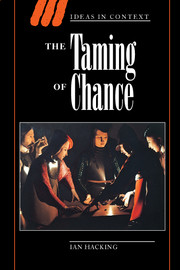Book contents
- Frontmatter
- Contents
- Acknowledgements
- 1 The argument
- 2 The doctrine of necessity
- 3 Public amateurs, secret bureaucrats
- 4 Bureaux
- 5 The sweet despotism of reason
- 6 The quantum of sickness
- 7 The granary of science
- 8 Suicide is a kind of madness
- 9 The experimental basis of the philosophy of legislation
- 10 Facts without authenticity, without detail, without control, and without value
- 11 By what majority?
- 12 The law of large numbers
- 13 Regimental chests
- 14 Society prepares the crimes
- 15 The astronomical conception of society
- 16 The mineralogical conception of society
- 17 The most ancient nobility
- 18 Cassirer's thesis
- 19 The normal state
- 20 As real as cosmic forces
- 21 The autonomy of statistical law
- 22 A chapter from Prussian statistics
- 23 A universe of chance
- Notes
- Index
- Ideas in Context
5 - The sweet despotism of reason
Published online by Cambridge University Press: 05 June 2014
- Frontmatter
- Contents
- Acknowledgements
- 1 The argument
- 2 The doctrine of necessity
- 3 Public amateurs, secret bureaucrats
- 4 Bureaux
- 5 The sweet despotism of reason
- 6 The quantum of sickness
- 7 The granary of science
- 8 Suicide is a kind of madness
- 9 The experimental basis of the philosophy of legislation
- 10 Facts without authenticity, without detail, without control, and without value
- 11 By what majority?
- 12 The law of large numbers
- 13 Regimental chests
- 14 Society prepares the crimes
- 15 The astronomical conception of society
- 16 The mineralogical conception of society
- 17 The most ancient nobility
- 18 Cassirer's thesis
- 19 The normal state
- 20 As real as cosmic forces
- 21 The autonomy of statistical law
- 22 A chapter from Prussian statistics
- 23 A universe of chance
- Notes
- Index
- Ideas in Context
Summary
Paris, 15 germinal de Van IV Isolated, and almost without any support, with neither public schools nor elementary textbooks, deprived of most of the means of propagation and influence, the moral and political sciences – strong only in the energy that is provoked by oppression, and using time and again the resources that arise from an instinct for liberty – the moral and political sciences, whether deceiving tyranny or defying it, prepared our century for the overwhelming revolution that brings it to a close and which recalls 25 millions of humankind to the exercise of their rights, to the study of their interests, and to their duties.
Published tabulations freeze the assembled numerical facts of a nation in cold print. The tables exhibit regularities from year to year. Can that new kind of thing, a statistical law of human nature, be far behind? Yes and no. It depends where you are. The Prussia that overthrew Napoleon created a conception of society that resolutely resisted statistical generalization. It gathered precise statistics to guide policy and inform opinion, but any regularities they might display fell far short of laws of society. The Prussians created a powerful bureau but failed to achieve the idea of statistical law. That was left for the France that survived Napoleon (‘If you want to attract the attention of the emperor, just recite some statistics’).
Statistical law needed two things. One was the avalanche of printed numbers that occurred throughout Europe. Without the post-war bureaucracies there would have been no tabulations in which to detect law-like regularity.
- Type
- Chapter
- Information
- The Taming of Chance , pp. 35 - 46Publisher: Cambridge University PressPrint publication year: 1990
- 1
- Cited by



